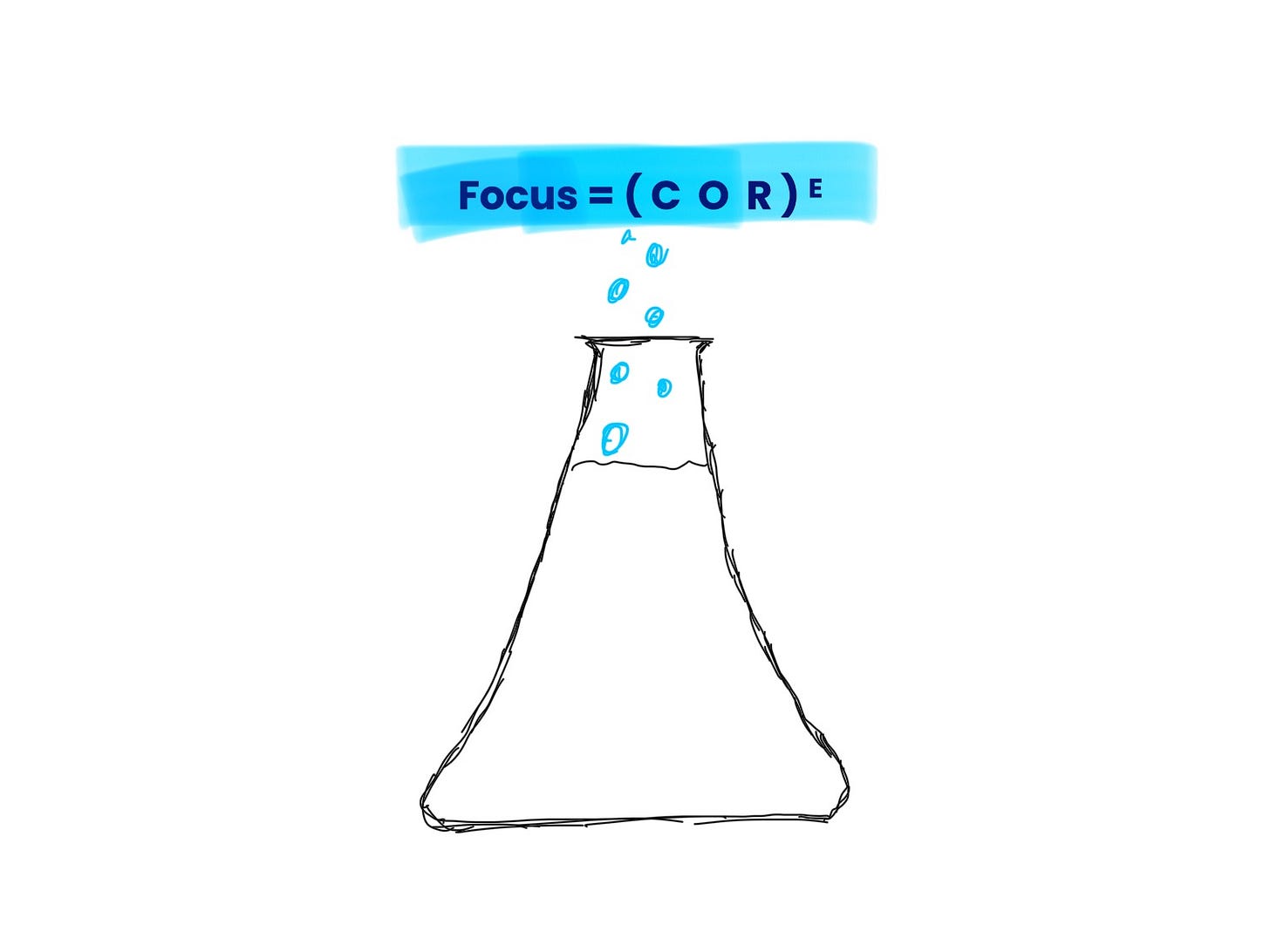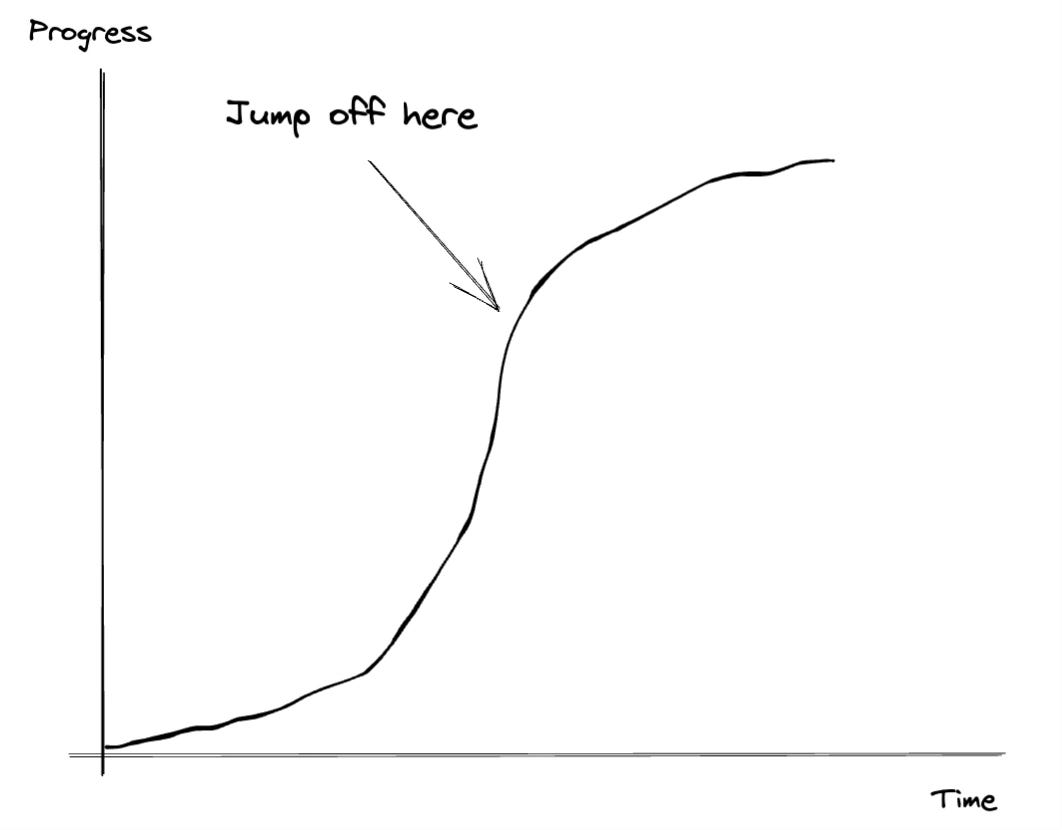I'm testing my own focus for 30 days (here's why and how)
My self-experiment
I’ve written a lot about focus lately.
But I feel it's time to go deeper.
So I’m running an experiment - on myself. For the next 30 days, I’ll dedicate my time, attention, and curiosity to just one dimension of my CORE formula: Clarity - knowing what truly matters most to me, and why.
I'm excited because I want to go beyond what I know about this question already. I also want to arrive at answers in new ways, not following the well-trodden path.
In the past months, I've shared what I learnt about focus. From my past experience, from my coaching, from what I read about the science and the best practices of highly focused people.
But an experiment is different. It happens now, it's visceral, lived in the body, and it pushes me beyond what I know (or think I know).
So this leads to a couple of questions:
Why run an experiment? And why now?
How will I self-experiment?
And what will you get out of this?
Let me share.
It's time to experiment
Two reasons why I'm experimenting:
Experiments are at the heart of learning.
An experiment is a structured way of getting into the unknown. You set up a hypothesis, you act, you observe what happens, and you adjust. That cycle - test, feedback, adaptation - is the heart of learning.
Error feedback is central to any experiment and, for that matter, learning. The brain constantly makes guesses about the world, compares them to reality, and rewires itself when the two don’t match. No mismatch, no learning. Which means: if I only stay in the comfort of what I already know, I rob myself of the very fuel for growth.
So I expect a lot of 'I didn't expect that' and 'Hmm.. I thought I knew but seems I don't'. And I want those reactions both on the topic, i.e. my insights about what truly matters & why, as well as on how I got to the insights. If I don't get that, I'm not learning something new, I'm executing. I'm after the 'right kind of wrong', the errors that bring me into new territory.And that's the second reason for experimenting: experiments are also at the heart of discovery. You pursue what's novel & what you're curious about in an open-ended way, at least you're open to be surprised. That's the story of discovery, from penicillin and 'America' to post-it notes.
To be open to discovery, I purposefully don't define an objective for this experiment. It would defeat the purpose of this experiment. Objectives are useful when you're improving something you already know how to do. But when you're exploring new ground, setting objectives can be limiting: you narrow your sight to what you've already imagined instead of exploring what's novel & what you're curious about.
So for now, my intention with the experiment is simple: to explore more deeply what matters most to me. The two essential criteria: Is this something novel? Is this something I'm curious about?
Why experiment now? Because growth doesn’t unfold in a straight line, it follows an S-curve.
At first, progress is slow as you figure out the basics. Then comes the steep climb, where small efforts yield huge gains. But eventually you plateau. You can decide to exploit that plateau (that's what we typically do when we pursue a career). Or you aim for growth and jump off the plateau to a new S-curve.
That’s where I sense myself right now. I’ve built my CORE focus framework. I’ve written about it, coached with it, refined it. The climb has been steep. But now, the returns are leveling off. To keep growing, I can’t just add more content. I need to stress-test and deepen what I already have.
And summer feels like the right season to do it, especially for the Clarity element. A quieter, more reflective rhythm. Fewer external demands. More mental space to treat my own life as a lab.
How I experiment
So with the ‘why’ and ‘why now’ set, how will I experiment?
Here are few guidelines & intentions:
I make this my top breakthrough priority for the next 30 days. This means: this experiment is the 1 thing I expect to bring me to a new level - of performing and coaching. Is this the most important thing? No. Breakthrough and importance are not the same thing - there are other really important things going on in my life. Is this the only thing? No, I'll make 20% of my time for this. I wrote an article on how to really focus on ONE thing.
30 days is long enough to matter, short enough to commit to. It gives me enough daily loops to apply & reflect and 4 weekly cycles to reflect and adapt
I'll read lightly, but deliberately. I won't sit in a library, but focus on what amounts to 4-5 books, which will certainly include shorter scientific articles but also more random posts online. Quality over quantity. A few well-chosen sources over everything there is on the topic.
I experiment with subtraction. Can I leave something away that I'd typically do? Maybe change how I spend my time? Maybe challenge a deeply held belief around clarity and focus?
I won't have a coach. I know this route already. It's always been helpful to me. But it's something I'm familiar with, so it's not in the spirit of this experiment.
I will use AI as a clarity partner, mainly chatGPT which I'm using with the memory feature turned on.
I'll reach out to friends & partners for some unconventional (but hopefully meaningful) conversations around clarity.
There is one practice I won't experiment with, but actually double down on: regular written reflection. I will do a short reflection at the end of each day and a longer weekly reflection.
What I will share with you
Each week, I’ll share what I discover: the books and articles I read, the micro-experiments I tried, the tools, exercises and GPT prompts that help (and the ones that don’t), plus a few personal reflections along the way.
At the end of the month, I’ll bring it all together into one picture of what 30 days of clarity taught me.
What happens when you dedicate an entire month to practicing one focus dimension?
I'm about to find out.





I like that you mention that you allocate time to it. I recently delayed switching from the Arc Browser to Dia because I know that even such a "simple" tool switch will slow me down and when I have little time and I can avoid it, I won't start these kind of experiments :).